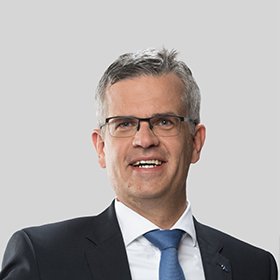
Process low quality post-consumer recyclate into film
The processing of post-consumer recyclate (PCR) is considered the most challenging discipline in plastics recycling: ‘With PCR, you never know for sure: the first batch can be good, but the second can be significantly worse,’ says Christoph Lettowsky, who advises customers on this topic at Reifenhäuser Blown Film. This is because PCR is made up of plastics from different material classes and often contains impurities and foreign substances that make processing more difficult. This leads to a quality that is significantly lower than that of virgin material and also fluctuates greatly.
However, fluctuations in the raw material are a considerable challenge for film manufacturers in their process, as Lettowsky explains: ‘Even medium-quality PCR can affect the stability of production or the quality of the film if manufacturers process it on blown film lines with a standard single-screw extruder.’ Optical defects (specks) can form and, in the worst case, the bubble can break because too many holes are created. As a consequence, certain raw material deliveries may then be unusable or only a small proportion may be added. It may also be necessary to use expensive additives.
Demand for recyclates is increasing
For many manufacturers, their productivity and profitability currently depend on the availability of high-quality recycled materials. However, the price for this fluctuates greatly - and is sometimes even higher than that of virgin material. ‘This poses a problem for manufacturers who have to fulfil certain recyclate quotas due to specifications from brand owners, politicians or self-imposed sustainability targets,’ says Lettwowsky. ‘However, as a machine manufacturer, we have good answers to this.’
PPWR drives demand for recyclates
In its Packaging and Packaging Waste Regulation (PPWR), the European Union has agreed that from 2030 - depending on the packaging and the material used - prescribed minimum targets for the proportion of recycled content in plastic packaging will apply. This is likely to increase the demand for (high-quality) recyclates.

The EVO Fusion twin-screw extruder already processes PCR of low and medium quality into high-performance blown film.
Becoming more independent of recyclate quality
‘Reifenhäuer's EVO Fusion technology makes manufacturers less dependent on recyclate quality,’ says Lettowsky. The EVO Fusion is a blown film line with a twin-screw extruder that is ideal for processing low-quality PCR granulates: The twin-screw technology mixes the raw material better than a single-screw extruder. The system is effectively degassed, removing any components that could disrupt the process. ‘With the EVO Fusion, manufacturers can even process heavily contaminated and inhomogeneous recyclates, of which they were previously only able to add a small proportion to the virgin material or which were unusable,’ says Lettwosky. The proportion of recyclate in production can also be significantly increased.
Customers around the world are already using EVO Fusion technology for various applications. Reifenhäuser has also explored the possibilities of the technology together with film manufacturers, converters and recycling partners. ‘We wanted to know how far we could go and have trialled a number of possible practical applications,’ says Lettwosky. ‘These even included trials with PCR recyclates that had already been sorted out by processors as ‘unusable waste’. We were even able to process this material stably using our EVO Fusion technology.’
Application examples: Processing post-consumer recyclate into film
Recycling of low-quality PCR into trash bags
Post-consumer recyclate from household collection is the lowest quality currently available on the market. This raw material is characterised by a very inhomogeneous material composition and a large amount of foreign matter and contamination. In tests carried out together with the Dual System in Germany (household collection and disposal of used packaging), Reifenhäuser was nevertheless able to produce a film with a recyclate content of 70 percent from this inferior raw material using EVO Fusion technology - something that would not be possible with a single-screw extruder. In the practical test, the film could be processed into trash bags using conventional methods.

Recycling of low-quality PCR into mailing bags
Film for mailing bags, such as those used for e-commerce returns, could also be produced from post-consumer recyclate from household collections. Due to a different film structure to the film for trash bags, the proportion of recycled material in the overall film was 65 percent.

Shrink film made from medium-quality PCR recyclate
Until now, shrink film for transport packaging has had to fulfil higher visual requirements. It is intended to hold PET bottles together, for example, and is usually transparent and sometimes printed with brand logos. With the help of EVO Fusion, these packaging properties could be produced from medium-quality PCR recyclate with a recycling content of 70 percent.
Enabler for post-consumer recyclate
Depending on the desired film quality, EVO Fusion can be used to process lower-quality recyclates - but even this technology cannot turn poor-quality PCR into film of the highest quality. ‘But it doesn't need to,’ explains Lettowsky. ‘The application for which the film is needed is always important: For example, transport packaging doesn't actually have to meet the highest standards of transparency and gloss.’ Manufacturers can therefore process different recyclate qualities for different products. ‘EVO Fusion enables them to have a reliable process,’ says Lettowsky.
This means that manufacturers can weigh up whether to buy high-quality recyclate for their products, which is more expensive, or whether they can achieve the desired properties with recycled material of a lower quality - and at a significantly lower cost. This in turn means that the investment in EVO Fusion technology is amortized more quickly when prices for higher-quality recyclates rise.
How you benefit from EVO Fusion:
Would you like to become less dependent on fluctuating recyclate qualities? Then please contact us:

